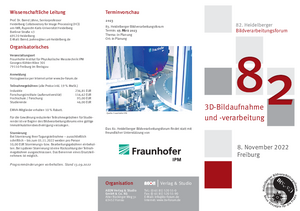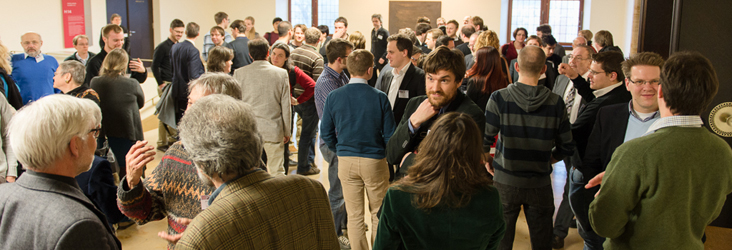
Events 2022
The Interdisciplinary Center for Scientific Computing (IWR) and its affiliated institutions organize a large number of workshops, conferences and other events for discussing latest scientific results as well as identifing upcoming challenges in the field of Scientific Computing. In addition the IWR regularly hosts events which emphasis on broadening and improving the interdisciplinary dialogue.
[January][February] [March] [April] [May][June][July][August] [September] [October][November] [December]
November

IWR Colloquium Winter Semester 2022 / 2023 & HGS MathComp "Mathematics of Life"
"Neuromorphic Computing With Self-Organized Networks"
Dr. Johannes Zierenberg • Max Planck Institute for Dynamics and Self-Organization
November 30, 2022 • 16:15
Our brains are comprised of billions of neurons that form a complex network. This network is a result of both evolutionary optimization (fostering a modular arrangement including highly specialized areas) and our own experience (storing memories and skills by adapting connection strengths) and determines how we process sensory input to produce meaningful responses. Since neurons communicate with short electrical pulses only when necessary, they are extremely energy efficient. Given our worldwide increase in computing demand, there is thus a strong incentive to develop low-energy neuromorphic computing paradigms that mimic the working principles of the brain. But what are the relevant working principles of the brain? How does a neural network develop useful dynamics? In this seminar, I will present minimal principles to ensure stable collective neural dynamics from a statistical physics perspective, discuss how these can be used to tune network states to task requirements and show how they can be applied to neuromorphic computing. While I mainly focus on experience-driven self-organization, I will finish with some ideas to include evolutionary-driven architectures in the future.
The IWR Colloquium will be held as an in-person event at the Mathematikon. In addition it will be streamed via Zoom.
For more information please visit the website of the colloquium.
“Mathematics of Life” is a special interest group organized by doctoral students of the HGS MathComp.
Website: HGS MathComp "Mathematics of Life"
Location: Mathematikon • Conference Room, Room 5/104, 5th Floor • Im Neuenheimer Feld 205 • 69120 Heidelberg
82. Heidelberger Bildverarbeitungsforum
"3D-Bildaufnahme und -verarbeitung"
8. November 2022
Viele neuartige 3D-Bildaufnahmesysteme sind von der Forschung in die praktische Anwendung überführt worden. Damit ist es an der Zeit, einen Überblick über die verschiedenen Grundprinzipien der 3D-Bildaufnahme zu gewinnen und die neusten fortschrittlichen Systeme
kennenzulernen.
Für dieses Thema konnte das Heidelberger Bildverarbeitungsforum das Fraunhofer-Institut für Physikalische Messtechnik IPM in Freiburg als lokalen Gastgeber gewinnen. Ein Highlight wird die Führung durch das Institut und die begleitende Ausstellung zu
dem Thema sein.
Nach zwei Jahren Heidelberger Bildverarbeitungsforum nur online können wir uns zum zweiten Mal wieder vor Ort treffen und bleibende Eindrücke und umsetzbare neue Erkenntnisse gewinnen gemäß dem Motto desForums: „Neue Konzepte für die Praxis“.
Ausstellern bietet das Forum eine gute Gelegenheit, genau der richtigen Zielgruppe ihre zum Schwerpunktthema passenden Neuentwicklungen vorzustellen.
Das Heidelberger Bildverarbeitungsforum
Eine Initiative
- zur Vermittlung aktueller Forschungsergebnisse für die Anwendung in der industriellen Praxis und auf wissenschaftlich-technischem Gebiet
- zur Förderung fächerübergreifender Kontakte zwischen Industrie, Hochschulen und Forschungsinstituten
- zum Anstoßen von Kooperationen zwischen Industrie und Forschungsinstitutionen
Das Motto: Neue Konzepte für die Praxis
Mit drei Veranstaltungen pro Jahr sollen aktuelle Fortschritte im Bereich der Digitalen Bildverarbeitung aufbereitet werden. Damit soll aufgezeigt werden, wie sich neu entwickelte Bildverarbeitungsmethoden in der Praxis anwenden lassen. Das Heidelberger Bildverarbeitungsforum greift jeweils ein aktuelles Thema heraus, das von namhaften Fachwissenschaftlern verständlich vorgetragen wird.
Veranstaltungsort: Fraunhofer-Institut für Physikalische Messtechnik IPM • Georges-Köhler-Allee 301 • 79110 Freiburg im Breisgau
October
IWR Colloquium Summer Semester 2022
"Human-Computer-Interaction and using AI to improve public health"
Dr. Theresa Hirzle • University of Copenhagen, Denmark
October 6, 2022 • 15:00
The IWR Colloquium will be held as an in-person event at the Mathematikon. In addition it will be streamed via Zoom.
For more information please visit the website of the colloquium.
Location: Mathematikon • Conference Room, Room 5/104, 5th Floor • Im Neuenheimer Feld 205 • 69120 Heidelberg
August
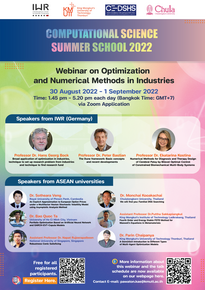
Virtual Computational Science Summer School
"Optimization and Numerical Methods in Industries"
IWR • Walailak University, Prince of Songkla University (Pattani Campus) • Chulalongkorn University • Silpakorn University • Mahidol University • Chiang Mai University • King Mongkut’s University of Technology North Bangkok
August 30 - September 1, 2022
From the vision “Stability, Prosperity and Sustainability,” Thailand has adopted “Thailand 4.0” as a policy vision for economic development which aims at driving the country out of a middle-income towards a high-income economy. Underlying this is no other than an attempt to change from the current economic model towards an “innovation-driven economy”—i.e., transitioning from an industry-driven development to a technology-, creativity-, and innovation-driven development by consolidating as well as integrating various fields of knowledge. This, thus, necessitates deepening mathematical research on optimization and numerical methods as it plays a considerable role in providing solutions for a variety of problems including those in such areas as industry, finance, engineering, economics and agriculture.
Realizing the importance of research on optimization and numerical methods, the Department of Mathematics, Faculty of Science, King Mongkut’s University of Technology Thonburi—in cooperation with the Interdisciplinary Center for Scientific Computing (IWR), Heidelberg University, the Federal Republic of Germany, and along with the nationwide as well as the Southeast Asian regionwide network of universities including Walailak University, Prince of Songkla University (Pattani Campus), Chulalongkorn University, Silpakorn University, Mahidol University, Chiang Mai University, and King Mongkut’s University of Technology North Bangkok—will organize an international “Workshop on Computational Science 2022: Webinar on Optimization and Numerical Methods in Industries.”
This year, the Department will co-host the event with the Department of Mathematics, School of Science, Walailak University, and the Department of Mathematics and Computer Science, Faculty of Science, Chulalongkorn University.
! Virtual Event • Registration required !
July
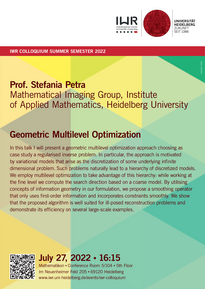
IWR Colloquium Summer Semester 2022
"Geometric Multilevel Optimization"
Prof. Stefania Petra • Mathematical Imaging Group, Institute of Applied Mathematics, Heidelberg University
July 27, 2022 • 16:15
In this talk I will present a geometric multilevel optimization approach choosing as case study a regularised inverse problem. In particular, the approach is motivated by variational models that arise as the discretization of some underlying infinite dimensional problem. Such problems naturally lead to a hierarchy of discretized models. We employ multilevel optimization to take advantage of this hierarchy: while working at the fine level we compute the search direction based on a coarse model. By utilising concepts of information geometry in our formulation, we propose a smoothing operator that only uses first-order information and incorporates constraints smoothly. We show that the proposed algorithm is well suited for ill-posed reconstruction problems and demonstrate its efficiency on several large-scale examples.
The IWR Colloquium will be held as an in-person event at the Mathematikon. In addition it will be streamed via Zoom.
For more information please visit the website of the colloquium.
Location: Mathematikon • Conference Room, Room 5/104, 5th Floor • Im Neuenheimer Feld 205 • 69120 Heidelberg
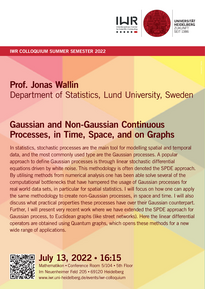
IWR Colloquium Summer Semester 2022
"Gaussian and Non-Gaussian Continuous Processes, in Time, Space, and on Graphs"
Prof. Jonas Wallin • Department of Statistics, Lund University, Sweden
July 13, 2022 • 16:15
In statistics, stochastic processes are the main tool for modelling spatial and temporal data, and the most commonly used type are the Gaussian processes. A popular approach to define Gaussian processes is through linear stochastic differential equations driven by white noise. This methodology is often denoted the SPDE approach. By utilising methods from numerical analysis one has been able solve several of the computational bottlenecks that have hampered the usage of Gaussian processes for real world data sets, in particular for spatial statistics. I will focus on how one can apply the same methodology to create non-Gaussian processes, in space and time. I will also discuss what practical properties these processes have over their Gaussian counterpart. Further, I will present very recent work where we have extended the SPDE approach for Gaussian process, to Euclidean graphs (like street networks). Here the linear differential operators are obtained using Quantum graphs, which opens these methods for a new wide range of applications
The IWR Colloquium will be held as an in-person event at the Mathematikon. In addition it will be streamed via Zoom.
For more information please visit the website of the colloquium.
Location: Mathematikon • Conference Room, Room 5/104, 5th Floor • Im Neuenheimer Feld 205 • 69120 Heidelberg
June
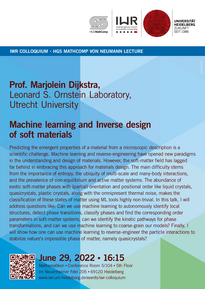
IWR Colloquium Summer Semester 2022 & HGS MathComp Von Neumann Lecture
"Machine Learning and Inverse Design of Soft Materials"
Prof. Marjolein Dijkstra • Leonard S. Ornstein Laboratory, Utrecht University
June 29, 2022 • 16:15
Predicting the emergent properties of a material from a microscopic description is a scientific challenge. Machine learning and reverse-engineering have opened new paradigms in the understanding and design of materials. However, the soft-matter field has lagged far behind in embracing this approach for materials design. The main difficulty stems from the importance of entropy, the ubiquity of multi-scale and many-body interactions, and the prevalence of non-equilibrium and active matter systems. The abundance of exotic soft-matter phases with (partial) orientation and positional order like liquid crystals, quasicrystals, plastic crystals, along with the omnipresent thermal noise, makes the classification of these states of matter using ML tools highly non-trivial. In this talk, I will address questions like: Can we use machine learning to autonomously identify local structures, detect phase transitions, classify phases and find the corresponding order parameters in soft-matter systems, can we identify the kinetic pathways for phase transformations, and can we use machine learning to coarse-grain our models? Finally, I will show how one can use machine learning to reverse-engineer the particle interactions to stabilize nature’s impossible phase of matter, namely quasicrystals?
The IWR Colloquium will be held as an in-person event at the Mathematikon. In addition it will be streamed via Zoom.
For more information please visit the website of the colloquium.
Location: Mathematikon • Conference Room, Room 5/104, 5th Floor • Im Neuenheimer Feld 205 • 69120 Heidelberg
May

IWR Colloquium Summer Semester 2022
"Cells, computers and microscopy: how can deep learning pave the way to scientific discovery?"
Dr. Anna Kreshuk • Group Leader “Machine learning for bioimage analysis”, Cell Biology and Biophysics Unit, European Molecular Biology Laboratory (EMBL)
May 11, 2022 • 16:15
Deep learning-based approaches have revolutionized virtually all domains of computer vision, including the field of microscopy image analysis. In image reconstruction and classification, in segmentation and artificial labelling, they have pushed both flagship projects and bread-and-butter everyday tasks, allowing image analysis to keep pace with the recent advancements in imaging technology and instrumentation. I will talk about the recent work of my group that has enabled the first segmentation of cells in a whole animal imaged with electron microscopy, our collaboration with microscope developers for trusted reconstruction of light field microscopy and our current efforts to reduce the annotation budget for training of segmentation algorithms. I will also show how we strive to make our methods accessible to biologists without computational expertise through our software ilastik and through the emerging community network collection at the BioImage Model Zoo.
The IWR Colloquium will be held as an in-person event at the Mathematikon. In addition it will be streamed via Zoom.
For more information please visit the website of the colloquium.
Location: Mathematikon • Conference Room, Room 5/104, 5th Floor • Im Neuenheimer Feld 205 • 69120 Heidelberg
February
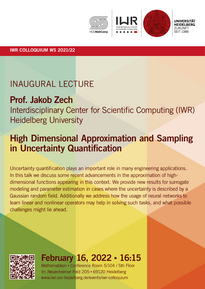
IWR Colloquium Winter Semester 2021 / 2022 & Inaugural Lecture
"High Dimensional Approximation and Sampling in Uncertainty Quantification"
Prof. Jakob Zech • Interdisciplinary Center for Scientific Computing (IWR), Heidelberg University
February 16, 2022 • 16:15
Uncertainty quantification plays an important role in many engineering applications. In this talk we discuss some recent advancements in the approximation of high-dimensional functions appearing in this context. We provide new results for surrogate modeling and parameter estimation in cases where the uncertainty is described by a Gaussian random field. Additionally we address how the usage of neural networks to learn linear and nonlinear operators may help in solving such tasks, and what possible challenges might lie ahead.
The IWR Colloquium will be held as an in-person event at the Mathematikon. In addition it will be streamed via Zoom.
If your are planing to attend in person you have to follow the 3G-rule set (vaccinated / recovered / tested).
For more information please visit the website of the colloquium.
Location: Mathematikon • Conference Room, Room 5/104, 5th Floor • Im Neuenheimer Feld 205 • 69120 Heidelberg
January
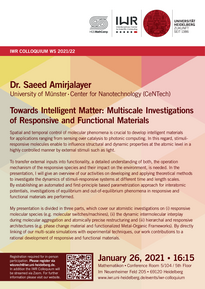
IWR Colloquium Winter Semester 2021 / 2022
"Towards Intelligent Matter: Multiscale Investigations of Responsive and Functional Materials"
Dr. Saeed Amirjalayer • Center for Nanotechnolgy (CeNTech) • University Münster
January 26, 2022 • 16:15
Please note that participation in person (max. 25) will be on first come first served basis prior registration via e-mail to wissrech@iwr.uni-heidelberg.de
In addition the Colloquium will be streamed via Zoom.
For more information please visit the website of the colloquium.
IMPORTANT COVID-19 INFORMATION FOR THE IN-PERSON COLLOQUIUM:
For the Colloquium we have to follow the 3G-rule set (vaccinated, recovered, tested):
- Each participant has to present a valid COVID-19 vaccination, recovery or negative test certificate.
- Each participant has to provide contact information preferably using a hand-held device scanning the QR-code in the conference room or in written form.
- During the Colloquium it is mandatory to wear a medical mask (FFP2 without a valve).
- There is room for 25 persons observing corona distance seating order
- To avoid unnecessary queues, please come early to pass through the scanning procedure (we recommend 20 min.) Opening will be at 15:45.
Spatial and temporal control of molecular phenomena is crucial to develop intelligent materials for applications ranging from sensing over catalysis to photonic computing. In this regard, stimuli-responsive molecules enable to influence structural and dynamic properties at the atomic level in a highly controlled manner by external stimuli such as light.
To transfer external inputs into functionality, a detailed understanding of both, the operation mechanism of the responsive species and their impact on the environment, is needed. In the presentation, I will give an overview of our activities on developing and applying theoretical methods to investigate the dynamics of stimuli-responsive systems at different time and length scales. By establishing an automated and first-principle based parametrization approach for interatomic potentials, investigations of equilibrium and out-of-equilibrium phenomena in responsive and functional materials are performed.
My presentation is divided in three parts, which cover our atomistic investigations on (i) responsive molecular species (e.g. molecular switches/machines), (ii) the dynamic intermolecular interplay during molecular aggregation and atomically precise restructuring and (iii) hierarchal and responsive architectures (e.g. phase change material and functionalized Metal-Organic Frameworks). By directly linking of our multi-scale simulations with experimental techniques, our work contributions to a rational development of responsive and functional materials.
Location: Mathematikon • Conference Room, Room 5/104, 5th Floor • Im Neuenheimer Feld 205 • 69120 Heidelberg
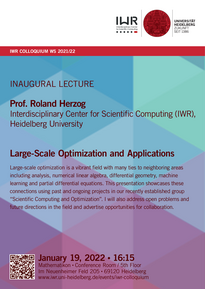
IWR Colloquium Winter Semester 2021 / 2022 & Inaugural Lecture
"Large-Scale Optimization and Applications"
Prof. Roland Herzog • Group Leader "Scientific Computing and Optimization", Interdisciplinary Center for Scientific Computing (IWR), Heidelberg University
January 19, 2022 • 16:15
Large-scale optimization is a vibrant field with many ties to neighboring areas including analysis, numerical linear algebra, differential geometry, machine learning and partial differential equations. This presentation showcases these connections using past and ongoing projects in our recently established group "Scientific Computing and Optimization". I will also address open problems and future directions in the field and advertise opportunities for collaboration.
The IWR Colloquium will be held as an in-person event at the Mathematikon. In addition it will be streamed via Zoom.
If your are planing to attend in person you have to follow the 2G-rule set (vaccinated / recovered).
For more information please visit the website of the colloquium.
Location: Mathematikon • Conference Room, Room 5/104, 5th Floor • Im Neuenheimer Feld 205 • 69120 Heidelberg
